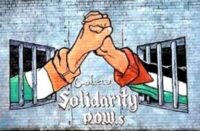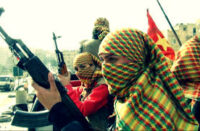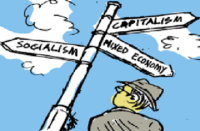In Gaza today, we are witnessing an atrocity: an attempt not merely to kill a people but to erase them. Whole families exterminated, hospitals turned to rubble, libraries turned to ash. This is not simply military conquest, it is the logic of settler colonialism: the logic of elimination. The goal is to make a nation vanish, from the land, from memory, from history itself.
This logic is not new. It is the same force that once swept across Africa in the boots and bullets of European empires. It is the same violence that torched African cities, broke kingdoms, and kidnapped leaders: not to bring civilisation, but to annihilate it. What was done to Africa then is echoed today in Palestine. The weapons are more sophisticated, the destruction is more immediate, the genocide is televised, but the mentality of the genocidal regime remains the same.
While going through emails of old files and articles in researching for another article that has been submitted for publication, I came across Walter Rodney’s How Europe Underdeveloped Africa, that was sent to me back in 2014. Having read through my notes at the time on this book, it brought in to stark light the similarities of what happened in Africa to what is currently happening in Palestine today. This book, stands as a towering rebuttal to the racist myth of Africa as an empty or “primitive” continent. It is a book everyone, who is trying to understand the rationale to the Genocide in Gaza, with the West’s complicity, should read. Rodney shows how, prior to colonial invasion, African societies were not “undeveloped,” but actively developing, often with cities, trade routes, and institutions on par with or surpassing Europe at the time.
Timbuktu was home to libraries and scholars centuries before the printing press reached England. The Benin Empire boasted complex urban planning and political sophistication when most European capitals were little more than feudal towns. Great Zimbabwe was a monumental centre of stone architecture and trade that flourished without European contact. But these histories were not convenient for empire. So they were wiped out, by cannon and fire.
The British razed Benin City in 1897, looting its bronzes and exiling its king. The French decapitated resistance in West Africa with mass executions. In the Congo Free State, millions were worked or whipped to death under Leopold’s reign of terror. This was not the collateral damage of empire—it was the very mechanism of empire. Israel is doing to Palestine, what the British, French and Belgians did to African nations.
Decolonisation Without Liberation
The colonial project didn’t just destroy buildings: it shattered political systems, social cohesion, and economic independence, it drew national boundaries in ‘the scramble for Africa’. It turned self-sufficient communities into appendages of European capital. Schools became indoctrination centres. Chiefs were turned into colonial agents. And when formal colonialism ended, financial and military control remained.
Today, African nations are chained by debt, bullied by institutions like the IMF, and looted by multinational firms. This is what neocolonialism looks like: the persistence of colonial relations under new management. Rodney was clear: only socialism can undo this history, not aid or NGO handouts. A planned economy, under the control of the working class and peasantry, is the only way forward.
For an Irish audience, these lessons matter. We know the tactics of empire: divide and rule, land theft, cultural erasure. We know what it means to have your leaders executed, your language suppressed, your land turned into a colony. And we know that internationalism is not a slogan: it is a duty.
That is why voices of cultural resistance are so vital. When artists like Kneecap speak out against the genocide in Gaza, they are attacked by the same type of forces of reaction who sought to criminalise our ownresistance and national struggle over the centuries. Their interventions matter. In every era, it is the poets and rebels, the organisers and truth-tellers, who carry the memory of the oppressed when history tries to erase them.
In Gaza today we have witnessed first hand what our ancestors were not able to see in the scramble for Africa, the daily destruction and the razing to the ground of Palestine as a nation: its buildings, its institutions, its industry, its land, its people. The greater Israeli project in the Middle East is born out the same rascist colonial mentality and policy, to meet the ultimate goal of the ruling class that drove the underdevelopment of the African Continent: strategic geopolitical control of a region to exploit labour and the earth. This time it is U.S. imperialism and its empire at its head, as opposed to the British Empire, but make no mistake, European governments and by extension the Irish government are complicit by not taking strong political, economic and legal action against Israel to stop this genocide.
And as socialists, we must say it plainly: imperialism is a global system of organised exploitation and destruction that serves the interests of the minority capitalist class, and it will not end through condemnation alone. It must be broken. Condemnation without understanding will be weak. Socialism without anti-imperialism will be hollow. Whether it’s Palestine, Africa, or the Irish working class, the same enemy robs us all: capitalism backed by empire. The struggle is international or it is nothing.
To remember the cities of Africa is to resist the narratives of the powerful. To recall what was burned and broken is to refuse the lie that the oppressed are to blame for their own suffering. History is a battlefield, and our job is not only to learn it, but to fight with it. Gaza is not alone. Africa was not passive. The genocide is real. The Irish peoples opinions are very clear and we cannot allow the Irish government to be neutral on this issue, for history will judge us on our capitulation and complicity, which the Irish people have continuously resisted.






